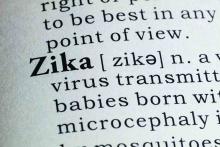Epilepsy occurred in approximately two-thirds of infants with congenital Zika virus infection in a study of 141 children.
“When ZIKV [Zika virus] infection is acquired in utero, it may be associated with epilepsy, and we characterized aspects of this complication in a study performed at our referral center,” wrote Hélio van der Linden Jr., MD, of Dr. Henrique Santillo Rehabilitation and Readaptation Center in Goiânia, Brazil, and colleagues in a letter to the editor published in the New England Journal of Medicine.
The researchers reviewed data from 141 infants aged 1-14 months with a median age of 9 months and Zika virus infection confirmed by laboratory analysis; 55% were girls.
The prevalence of epilepsy was 67%, with a mean age at onset of 4.9 months. Based on data provided by parents, 74% of the children experienced seizures at 6 months of age or younger.
Overall, 77% of the infants experienced a single type of seizure. Epileptic spasms, the most common type, occurred in 72% of infants, followed by focal motor seizure (21%) and tonic seizures (4%).
All 95 epileptic infants were treated with antiepileptic medications and 62 (65%) achieved remission. Of those in remission, 24 (39%) received monotherapy and 38 (61%) received polytherapy. The drugs most associated with seizure control were vigabatrin, levetiracetam, valproate, and phenobarbital.
The prevalence of epilepsy in this study was higher than that seen in previous studies, and most patients had early-onset, drug-resistant epilepsy, the researchers noted. However, burst-suppression patterns and hypsarrhythmia on EEG predicted more severe disease and suggest that epilepsy might complicate cases of congenital Zika infection, they said.
The researchers had no financial conflicts to disclose.
SOURCE: van der Linden H et al. N Engl J Med. 2018 Aug 30. doi: 10.1056/NEJMc1716070.


